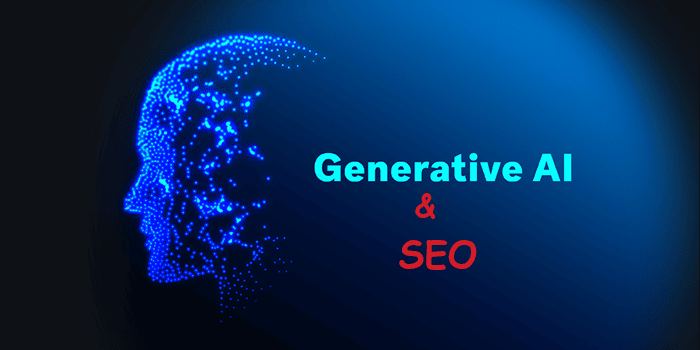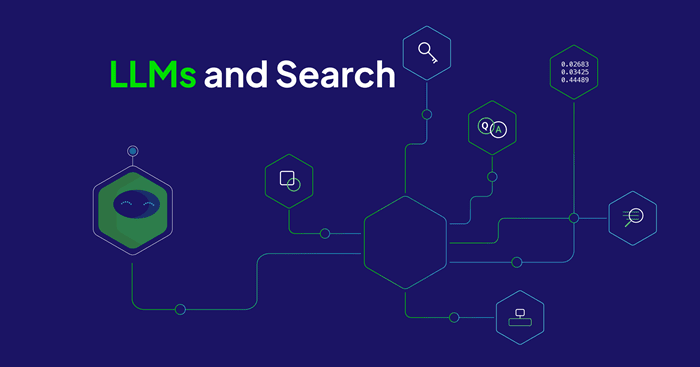Generative AI is changing the face of SEO, particularly for deep websites with heavy technical complexities. Incredibly powerful AI can analyze data, predict trends, auto-create content, and automate processes that enable your SEO approach to move from reactive to proactive.
Understand ways you could supercharge your SEO through generative AI applications like ChatGPT and Bing Chat.

Enriching Content
Get the full potential of generative AI with complete confidence in your content strategy. AI supports you in this respect and acts as a go-to resource for tasks such as content gap analyses, identification of opportunities for content enrichment, and so on.
Predictive Content Planning
Use AI to analyze internal and external search behaviors and sales data for the detection of new trends. For instance, an online book retailer may track on Google, Amazon, or other marketplaces surges in search volumes and conversation around genres of books, books themselves, or authors to pick up on new content development opportunities.
Seasonal Content Alignment
With generative AI, deliver a content calendar that coincides with seasonal events, literary events, book launches, or even writing competitions. This way, content marketing for the site will always be relevant and timely.
Improvement of Information Architecture
An internal linking structure optimized for the customer’s journey to purchase and their search behaviors ensures capturing traffic from both top and mid-funnel levels. It also helps enhance the user experience toward better engagement and conversion.
Generative AI aids organization-inventory, content, and demand data required in creating an optimal internal linking framework.
Organizing Inventory for an SEO-Optimized Taxonomy
- Analyze with generative AI content already live on a website, be it product listings for an e-commerce site or deep repositories of articles for a web publisher.
- Extract a robustly defined organizational structure representing the site’s content across a range of user intents and needs throughout the purchase cycle.
- Cross-reference this against demand and internal search data to make sure alignment is proper to user vocabulary normally used in relevant searches.
- Use this taxonomy as the backbone of the website architecture to enhance the user experience.
For instance, extraction of a taxonomy from unstructured book description data for an antique online bookshop requires AI for the efficient creation of logical and granular categories with attribute taxonomies on genres, subgenres, authors, editions, themes, moods, publishing houses, eras, among others.
You can also read: Understanding the Importance of SEO in Today’s Digital Age
Adaptive Navigation
Generative AI proves helpful to analyze customers’ browsing and search patterns, thus helping better navigate the website. Keeping in mind the right mix of supply and demand data along with user preferences, AI takes the experience of users to a whole new level by making it more user-friendly.
Improving Data Analysis
AI is an extraordinary tool for understanding your audience, their search patterns, and behaviors on-site to refine and improve SEO strategy in the process.
User Engagement Insights
Analyze user engagement using generative AI tools, including but not limited to page views, time spent on pages, and click-through rates. Recognize the most engaging content and which page types work best by understanding the way users interact with different content formats. Further, develop the insights to improve overall user engagement.
Behavioral Pattern Recognition
Use AI capabilities to identify patterns in user behavior, such as common exit points or sections that get browsed the most. Analyze these findings for indications of user experience issues or opportunities for SEO content improvement.
Elevate Keyword Strategy
Apply generative AI technology to go beyond classic keyword research by analyzing competitors and predicting high-value, popular, and relevant keywords for your business.
While many of the existing SEO platforms like Semrush, Ahrefs, Moz, and more have already integrated some degree of AI into their tools to make them more functional, it is this AI-powered Bing Chat that possibly gives a whole new dimension to keyword research.
SEO Query Generation Using Bing Chat
- Identify Key Themes and Topics: Know what the major themes and topics related to your industry are. Examples here may include, for a bookshop, “Nelson Mandela literature, “rare first editions, ” or “poetry collections.
- Formulate Customer Search Questions: Using the list of topics and phrases, add as many synonyms as possible, and prepare an extended list of seed searches your customers could use. Examples include “best Nelson Mandela novels,” “where to find rare first editions,” or “poetry book recommendations.”
- Interact with Bing Chat: Open Microsoft Edge and open Bing Chat, emulating customer searches by pasting the formulated questions into the chatbot.
- Analyze the Results: Go through the search results yielded by Bing Chatbot for each query. Note what types of content posts, product pages, and articles are ranking well, noting recurrent themes or keywords inside the top results, as those are likely to be top SEO performers in your niche.
- Apply Your Insights to Your SEO Strategy: Now take this insight and apply it to your content strategy. For instance, if the top results for “Nelson Mandela literature guides” are lists of recommended books, an analysis of the key themes and authors of the era, or even poetry compilations, seize the opportunity to optimize existing or create new content that can be better competitively served by one of these formats.
Turn key themes and questions into questions such as: “What subjects/genres does Nelson Mandela write about?”; “How does one collect rare first editions?”. This is very well worth doing since it shows in what wider context those keywords are being used and talked about.
Note the frequency and see if there are terms that seem to occur particularly in certain contexts or with certain themes. For example, if you notice that “rare first editions” occur more often when people talk about collecting and preservation, then tailor your content in ways that may speak to that particular need.
Schema Structure Optimization for SERP features
Google’s Search Engine Results Page (SERP) has changed dramatically since the days of “10 blue links.” The universal results of today are made up of many different SERP features. While not all of them are designed to drive traffic to the publisher’s website, visibility on all of these features is critical to building brand awareness and top-of-mind awareness.
The thing is, tools like ChatGPT are very useful for highlighting opportunities from rich snippets to many other SERP features, based on different content or page types, such as book listings, reviews, question-answer pages, and even images. Moreover, ChatGPT can also help you craft the right schema markup.
Featured snippet listings-grabbing the elusive Position Zero-often report CTRs of more than 30%. Let ChatGPT suggest formatting options to optimize your high-ranking pages for featured snippet placements and maximize this organic CTR opportunity.
You can also read: The Best Tools for PPC Agencies Must Use in 2024
Audience Segments
Go beyond Google Analytics affinity categories and unlock with AI-specific customer segments that are highly engaged those readers of historical fiction or collectors of rare collectibles. Use these insights to expand content offerings in those areas or to build out better product inventory to capture organic demand.
Uncover Insights from Off-page Data
The external source signals will incorporate brand sentiment, ratings, and reviews; user feedback presented on social media and other platforms presents opportunities for valuable product improvements. These open up great avenues to build brand authority and trust very important signal in this day and age of E-A-T.
While many platforms and tools use generative AI for brand sentiment analysis, this can also be done with the help of tools like ChatGPT or Bing Chat, or any other similar variants.
- Data Aggregation: Leverage Bing Chat to pull recent news articles, blog posts, social media content, or forum discussions of your brand. Compile all these into a document or database for in-depth analysis.
- Initial Analysis using ChatGPT: Feed the information that you compiled into ChatGPT, asking it to summarize the general sentiment that is carried in the data you have collected. Press the chatbot for more information on trending themes and topics often related to your brand.
- Contextual Understanding: Use Bing Chat to understand the deeper sentiment in context. In this case, if negative, find out why looking into related news or social media posts. Using Bing Chat, understand data in-depth, find user sentiments, spot patterns, and actionable recommendations on how to improve online reputation, adjust product inventory, or address other areas of concerns or opportunities.
Engaging Content Creation
The emotional needs of the audience help in driving the creation of more relevant content that would interest users and increase engagement. Use tools like Claude by Anthropic to decode feedback, extract emotional triggers, and understand hidden user preferences.
Be continuously re-evaluating and refining your SEO content strategy with new insights from Claude, enabling you to keep relevant so that your content keeps dazzling your audience.
Optimizing SEO Analysis
Use generative AI to automate the needed yet redundant tasks of SEO analysis so that more productive time is spent freeing up and enabling strategic growth. Apply affordable and accessible solutions such as Google Sheets and ChatGPT to ongoing data analysis and tracking.
- Automation of Data Exports: Automate exports from various systems, such as GA, GSC, MySQL, and other SEO platforms, to Google Sheets directly. This could be made possible either through add-ons available within Sheets or through third-party software, Google Apps Script, or native integrations.
- Use GPT for Sheets or Similar Add-On: Employ GPT for Sheets or similar add-ons to bridge your OpenAI API. Instruct the system to read data directly in Google Sheets, therefore making your workflow easier and further automating the analytics.
Trend Prediction
Identify and seize emerging trends using generative AI ahead of any competition. The market offers a spectrum of AI-driven predictive models freely available on Google Trends to more sophisticated solutions, geared for enterprises that build custom predictive models using frameworks like TensorFlow or Keras.
Although the AI will predict trends, the work requires more creativity in the aggregation of information, summarization, and analysis. Instruct the tool to collect recent news articles, blog posts, and other relevant data on one particular topic, and then ask for summaries of the same along with an overview of current market trends so as to pick up relevant insights.
You can also read: Will ChatGPT Pose a Cybersecurity Risk?
Improve SEO Storytelling
Bring your SEO strategy to life by using AI and turning SEO data into thrilling stories that make stakeholder presentations, strategy pitches, and quarterly check-ins so much more interesting.
- Data Storytelling: Let AI analyze and provide SEO metrics in the form of captivating stories that paint a graphic outlook of your digital journey and its feats. Frame this story in the traditional format of a three-point structure for maximum effect.
- Presentation Enhancement: Let generative AI create corresponding visuals that make your decks clearer, more impactful, and consistent.
- Audience Analysis: Knowing your audience-who they are and what triggers them works like magic for any successful SEO presentation. AI can help you understand your audience and its internal dynamics, using known data and inferences. Evaluate the insights and suggestions generated by AI and integrate those that you feel will bring subtle yet striking changes to your pitch.
Improve SEO Results with Generative AI Strategies
Generative AI tools, like ChatGPT, Bing Chat, and Anthropic’s Claude, hold tremendous opportunities for many optimizations within an SEO strategy. AI will also help improve efficiencies, unlock insights, predict trends, and facilitate how websites can position better against search intent and user needs.
In embracing the diversity inherent in AI applications, SEO professionals will shift from a reactive stance to a proactive stance-unique in that their work allows iterative tuning and performance improvements.
![]()












